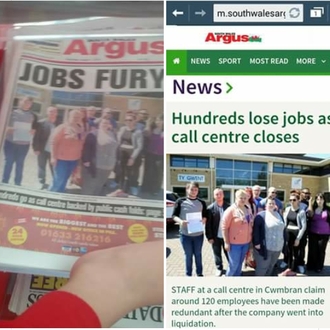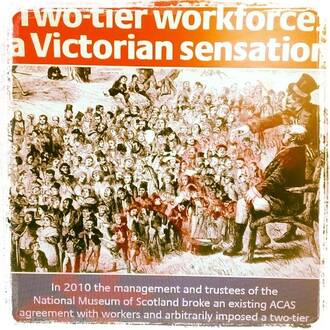-
Review Concentrix and HMRC Investigations of Tax Credit claimantsWe're going to see Iain Duncan Smith next month and we want to take this petition with us with as many names as possible. You may not get why we're so wound up about it. Let me share a few stories (all real, local people). Before I do, lets just remember what tax credits are for. They are contributions from the government towards the cost of ofsted registered childcare so that work is possible. Many users of tax credits are single parents but many are also in couples. They are for people for whom work would not be possible without assistance towards childcare (which by the way has to be paid one month in arrears and is subject to fines for late payment). One woman was told that her tax credits would stop because her daughter doesn't exist. The fact that said daughter was crying in the background whilst her stressed and bewildered mother was trying to sort it out whilst wondering how she was going to pay for childcare was irrelevant. Another woman was told that her tax credits would be cut to £85 a month (a contribution towards an £800 childcare bill for 2 children representing well over half of the whole family's take home pay.)This was because concentrix concluded that a previous childcare provider had not been ofsted registered and therefore this lady was in debt to them for falsely claiming help towards childcare that year. Of course the provider had been ofsted registered, we may never know what information concentrix used to reach their conclusion but our member had to shoulder the full responsibility of proving her case, all the while on reduced tax credits and even had to arrange a meeting with her employer to explain that work would not be feasible if she couldn't prove her case. The member is now vindicated but the stress she was wrongly put under was extremely serious and unnecessary. Another member was subject to a thorough investigation of her circumstances after which concentrix reached the bizarre conclusion that her total childcare costs for 2 children were £4 a week....totally validates any claim that the government and their agencies are out of touch with real life...if such a cheap provider exists I want their details! I could go on....case after case, story after story - already vulnerable people being made to feel desperate, hopeless and quite frankly criminalised. Please, if you agree with us, sign and share to say this is not OK. Perhaps there's a case to be made for people to be investigated as benefit fraud happens - but the way it is being done is unnecessarily negatively impacting people who could do without it!958 of 1,000 SignaturesCreated by Redbridge Gingerbread
-
Stop the theft of electricitySmart meters only record electricity used and not the excess electricity generated by small generators like personal homes with solar panels. The government pays a feed-in tariff but the excess electricity is still being placed on the national grid and sold by electricity companies when they have not paid for it. This is theft, pure and simple. Stop this theft by ordering all smart meters to record both incoming and outgoing electricity and make the electricity companies pay for the excess being generated or deduct the excess from the incoming electricity.6 of 100 SignaturesCreated by Tony Upton-Huang
-
All family review of child povertyIt is essential that we get a proper definition of child poverty so that any government can make proper decisions about how the will address child poverty. The decision to exclude in-work households means that the review will remove those families whose parents are working on low incomes and struggling to pay their bill! This decision would mean a potentially huge chunk of potential vulnerable children will be excluded and probably not become entitled to any support that should be entitled to. The UK has a a lot of low income families. Is this the reason they are excluded? Support this campaign so that the commission can make a valued decision on how to properly address child poverty across the UK.18 of 100 SignaturesCreated by peter brown
-
Stop Arms To SaudiWe have created this campaign in collaboration with Campaign Against the Arms Trade, Amnesty International (University of Liverpool group) and the Green Party. The United Nations’ Arms Trade Treaty (ATT) states that weapons should not be sold to countries if there is a potential that the arms or items could be used to facilitate a serious violation of human rights. Whilst Saudi Arabia has been deemed ‘’a very old ally and partner’’ by David Cameron (2012), it continues to abuse the human rights of its citizens based on their gender and sexuality and refuses to acknowledge a need for change. Our mutual economic relationship with this country makes us complicit in the systematic abuse that takes place. The UK should consider not only the articles in the ATT but a country’s approach to human rights as a whole. Saudi Arabia consistently commits egregious breaches of human rights. It outlaws freedom of speech, expression or belief outside of Wahhabi Islam and regularly imprisons opponents without trial. Homosexuality is branded a crime and is punishable by torture and execution. Saudi Arabia and the UK have long had close dealings in the arms trade. Saudi Arabia is Britain’s largest customer for weapons and the UK is the Gulf nation’s single biggest supplier, according to Campaign Against the Arms Trade (CAAT). Weapons created in the UK were used to bomb Yemen this year in what has been dubbed ‘’a humanitarian catastrophe’’ (Andrew Smith, CAAT). Saudi Arabia is the biggest sponsor of global terrorism, funnelling money to rebels in Syria and to Sunni terrorist groups worldwide. The terrorist organisation IS are ‘’a product of Saudi ideals, Saudi money and Saudi organisational support’’ (Senator Bob Graham, the 9/11 commission). How can we claim to be a country that supports equality, diversity and freedom of speech when we continue with this inherently hypocritical trade relationship? Once again, we urge you to take action, Yours, the undersigned,2,160 of 3,000 SignaturesCreated by Katherine Wright
-
Refugees Welcome in West Norfolk & Kings LynnAylan, the toddler who drowned fleeing Syria, was just three years old. His town was under attack by Isis. His five year old brother and his mum also died trying to reach safety. Yet our prime minister said ‘we won't take any more refugees’. He thinks that most of us don't care. But 38 Degrees members do care. We don't want Britain to be the kind of country that turns its back as people drown in their desperation to flee places like Syria. So let's stand up for Britain's long tradition of helping refugees fleeing war. Let's show the Prime Minister that we, the people of the UK, are proud to do our part and provide refuge to people in their hour of need. Please sign and share, or start your own petition for your town or city here: https://you.38degrees.org.uk/efforts/refugees-welcome181 of 200 SignaturesCreated by Rosie Woolgar
-
Keep Gourmet Street Food in Perceval Square."As many of you are aware, we have been told by the council that we are no longer allowed to have our trailer in Perceval Square. We are really upset about this as they only gave us permission in the beginning because "we were offering something unique and different". To change their minds now, we feel is really unfair. All we ever wanted to do was to bring something new to Stornoway - we are currently 2nd on Tripadvisor for restaurants in Stornoway (we must be doing something right) and we see you all as friends. We had a meeting recently with the council and we asked them if there was anything we could do to help resolve the situation. "Move" was the answer." Gourmet Street food is a small local business, using local produce which brings to the town something that is both unique and highly valued in it's offering. Perceval square as it stands is a under-utilised public realm which is brought to life by this focal point through the week offering not only great local food but also local hospitality and craic to both visitors and locals alike. We simply ask that the Comhairle support local businesses and be flexible in allowing trailers to operate in Perceval square.808 of 1,000 SignaturesCreated by Craig Cameron
-
Why do we pay for Leashold?Most Leasehold properties are rented by the poorer members of our society; those who can least afford to pay. This charge is placed upon homes that stand on land belonging to THE RICH. It was an ancient charge invented by the Land Barons in Medieval times, as a tax on the poorest of their labourers.9 of 100 SignaturesCreated by Andrew Galfskiy
-
New State Pension should apply to allOlder people who have already retired, and those due to retire before 6th April 2016, are and will continue to receive the 'old' basic State Pension, currently £115.95 per week. Those retiring after 6th April 2016 will receive the new State Pension, currently £151.25 (to be finalised in autumn 2015). This is fundamentally unfair to existing pensioners, who in many cases fought for their country, and then worked and contributed all their lives, to be treated as second class citizens. Treat everyone the same, give them the new State Pension. It is all very well to say "there is a safety net" of the benefits system, where poor pensioners can go, cap in hand, to explain how poor they are, show all their incomings and outgoings, and beg for state assistance, but understandably many pensioners have too much dignity to do this. It should not be necessary. Be fair to the people who were fair to this country. Give them the same pension as everyone else will now receive. Be fair.2,513 of 3,000 SignaturesCreated by Paul Fisher
-
stopping companies starting new companies when they have become bankruptBecause 7 months ago a company I worked for called Griffin Place Communications used a loophole in the law to set up a Telesales Communication's Company in my deprived neighbourhood , taking full advantage of the Welsh Government's grants that were on offer which totalled £600.000 and then went bankrupt leaving 120 of us without pay and destitute while they and then set up a new Telesales Communication's Company in another Welsh town just up the road from us.139 of 200 SignaturesCreated by Judith Davies Davies
-
Save our CoachesThe increases in coaches fees has meant that some skater can no longer afford to have lessons. Some of the skaters that have/will have to give up skating are competing in British Championships and looking to compete for this Country. The winter sports club is a charity that is meant to support all winter sports and it is them that will caused the decline in Ice Skating. Some coaches have had to stop coaching altogether as no longer have enough skater to afford to continue.1,848 of 2,000 SignaturesCreated by Angela Buckley
-
No taxation without representation?I pay all my income tax in Britain, but I am now disenfranchised. I have lived in France for seventeen years, but intend to return to Britain eventually. Why do I no longer have a vote? It should surely be possible for those of us who wish to continue voting to register. The argument is that too few ex-pats wanted to vote, but what if we do? I understand that French ex-pats are represented. I pay my taxes; I want to vote.5 of 100 SignaturesCreated by Magaret Bradley
-
End the two-tier workforce at National Museums of ScotlandIn 2011 the management of National Museums Scotland broke an existing ACAS agreement and arbitrarily and unilaterally imposed a two-tier wage structure upon its lowest-paid workers (principally Cleaners, Visitor Services Assistants, Housemen, Security) without consultation or negotiation with the recognised Trade Unions. Staff employed since 1st January 2011 are on reduced terms and conditions without a weekend working allowance which is paid to compensate for having to work anti-social hours. Many of this lowest paid group only get one full weekend off once every seven weeks, which has a detrimental impact on family and social life. The consequence is that low-paid workers on the same shifts, doing the same work, are being paid up to £3,000 less than their colleagues. These workers make the National Museums Scotland the top rate attraction it is, and it is only fair that they get paid properly for their hard work. The Joseph Rowntree Foundation states that those earning under £17,100 a year are being paid a Poverty Wage, and many of our members earn well below that. Senior Scottish Politicians, in opposition against Westminster, have recently been calling for recognition of weekend working payments for those who give up valuable family and social time. These payments make up a large part of low-paid workers’ take home pay. PCS totally agree with safeguarding weekend working rights, and believe that if it is good enough for other workers, then National Museums Scotland staff deserve this too. Both Museum management and the Scottish Government need to embrace the principle of recompensing weekend work and accept PCS proposals to settle this long- running dispute. We do not believe that low-paid culture workers deserve to suffer at the hands of austerity, especially when heritage and culture contribute so much to the Scottish economy. The Museum’s own figures show that it contributes £65million to the economy. PCS Members at the National Museums of Scotland have been taking part in discontinuous strike action for over 2 years. Despite repeated requests to come to a negotiated settlement with management, this has not happened.2,800 of 3,000 SignaturesCreated by Clara Paillard
Hello! We use cookies to improve your experience by providing insights into how the site is being used. Find out more.












